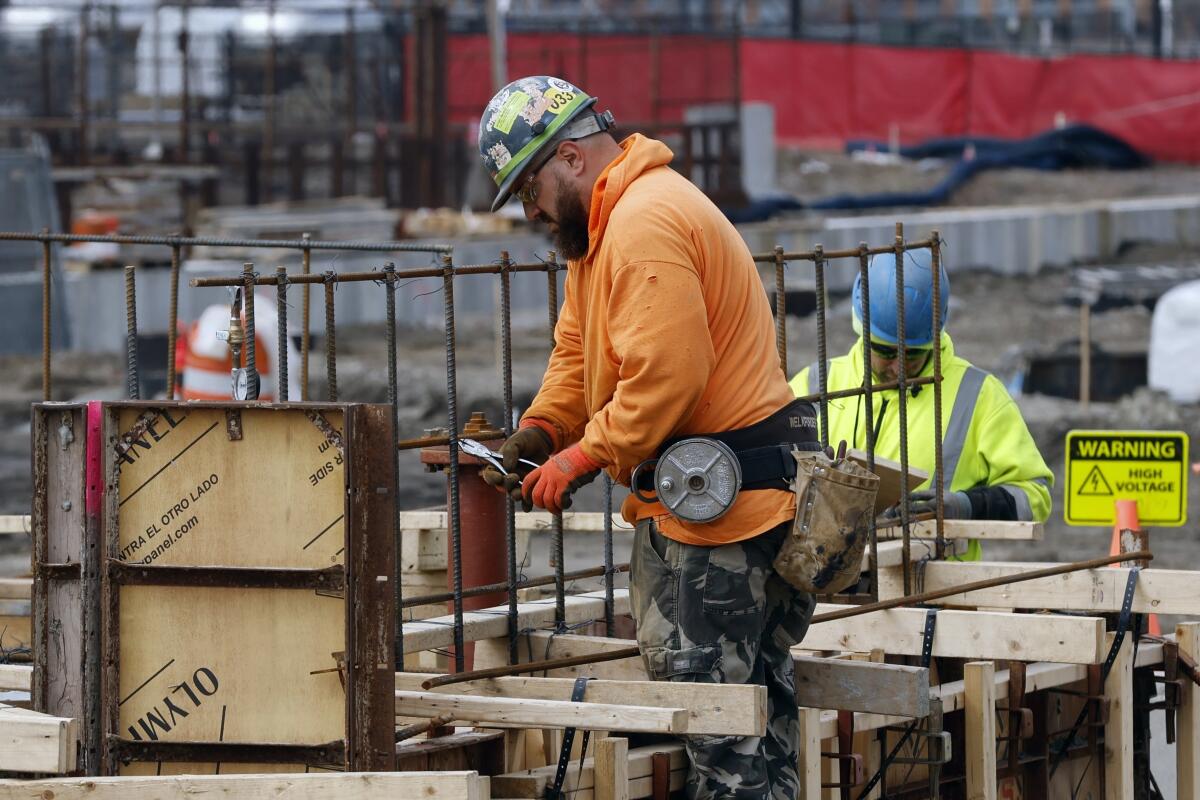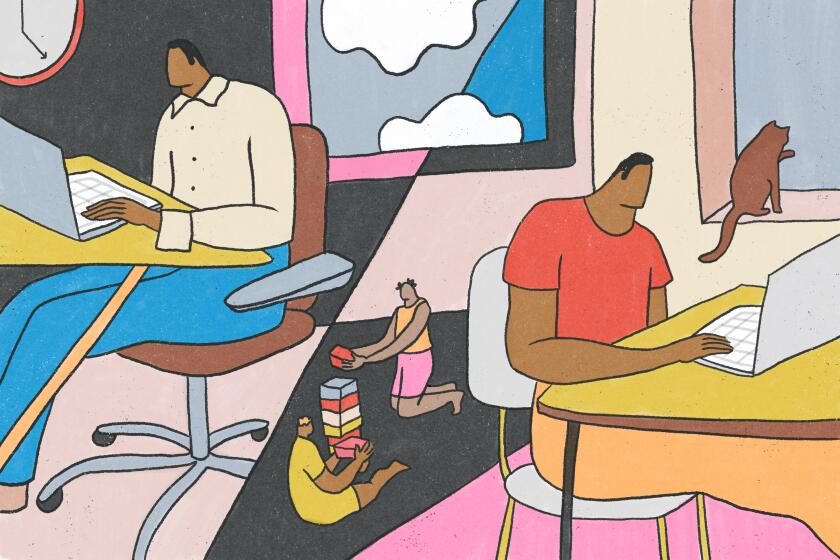U.S. employers added a solid 187,000 jobs in August in sign of still-resilient labor market

- Share via
U.S. employers added 187,000 jobs in August, evidence of a slowing but still-resilient labor market despite the high interest rates the Federal Reserve has imposed.
Last month’s job growth marked an increase from July’s revised gain of 157,000, but it still pointed to a moderating pace of hiring compared with the sizzling gains of last year and earlier this year. From June through August, the economy added 449,000 jobs, the lowest three-month total in three years. In addition, the government revised down the gains for June and July by a combined 110,000 positions.
Friday’s report from the Labor Department showed that the unemployment rate rose from 3.5% to 3.8%, the highest level since February 2022 though still low by historical standards. But the rate rose for an encouraging reason: A sizable number of people — 736,000 — began looking for work last month, the most since January, and not all of them found jobs right away. Only people who are actively looking for a job are counted as unemployed.
Indeed, the proportion of Americans who either have a job or are looking for one rose in August to 62.8%, the highest level since February 2020, before COVID-19 slammed into the U.S. economy.
The Fed’s streak of 11 interest rate increases has helped slow inflation from a peak of 9.1% last year to 3.2% now. A decelerating job market could help shift the economy into a slower gear and reassure the Fed that inflation will continue to ease. For that reason, many economists think the central bank may decide that no further rate hikes are necessary.
Friday’s jobs report also showed that wage gains are easing, a trend that may help signal to the Fed that inflation pressures are cooling: Average hourly wages rose 0.2% from July to August and are up 4.3% from August 2022. The year-over-year increase was down from 4.4% in both July and June.
Employers are coming up with a whole new class of catchphrases to promote their flexible-work options, highlighting the challenge of establishing norms in an ever-shifting modern workplace.
The Fed wants hiring to slow because intense demand for labor tends to inflate wages and feed inflation. The central bank hopes to achieve a rare “soft landing,” in which its rate increases would manage to slow hiring, borrowing and spending enough to curb inflation without causing a deep recession.
“This is close to what the Fed wants to see,’’ said Gus Faucher, chief economist at PNC Financial Services Group. The August jobs report “could be a way to a soft landing.”
Still, Faucher cautioned that the economy may not have yet absorbed the full effects of the Fed’s rate hikes, which is why he still expects a recession in early 2024.
So far, the job market has been cooling in the least painful way possible — with few layoffs. The Labor Department reported Thursday that the number of Americans applying for unemployment benefits — a proxy for job cuts — fell for a third straight week.
The back-to-the-office campaign by many employers has run into resistance from workers. They’ve struck a truce of sorts — hybrid work.
Among sectors of the economy, by far the biggest hiring gain last month — 97,000 — came in the healthcare industry, which does not depend on the rise and fall of the economy. Construction companies added 22,000, factories 16,000, and bars and restaurants nearly 15,000.
By contrast, trucking companies shed 37,000 jobs, reflecting the shutdown of the Yellow trucking firm. And music and movie companies lost 17,000, a drop that the Labor Department attributed to striking Hollywood actors and writers.
Taken as a whole, some economists saw Friday’s report as reflecting an economy that is returning to its pre-COVID state, before the pandemic recession struck in 2020, followed by an explosive economic recovery.
“The 187,000 gain in non-farm payrolls, jump in the unemployment rate and slowdown in wage growth in August all add to the evidence that labor market conditions are approaching pre-pandemic norms,’’ Andrew Hunter of Capital Economics wrote in a research note.
Optimism about a soft landing has been growing. The economy, though growing more slowly than it did in the boom that followed the pandemic recession of 2020, has defied the squeeze of increasingly high borrowing costs. The gross domestic product — the economy’s total output of goods and services — rose at a respectable 2.1% annual rate from April to June. Consumers continued to spend, and businesses increased their investments.
Economists and financial market analysts increasingly think the Fed may be done raising interest rates: Nearly 9 in 10 analysts surveyed by the CME Group expect the Fed to leave rates unchanged at its next meeting, Sept. 19-20.
Even with the slowdown in job growth, many employers are still hiring, and some are having trouble filling positions. One such company, InCharge, which develops charging systems for electric vehicles, is adding six to 10 employees each month to its roughly 200-strong workforce. The Santa Monica company has hired two in-house recruiters, in addition to working with employment agencies and offering bonuses to employees who bring on new staffers.
Still, Terry O’Day, the chief operating officer, said he does see signs that the job market is slowing. He’s hearing from more recruiting companies that represent people looking for work.
Another company, Oransi, a maker of air purifiers, plans to hire 100 workers in the United States over the next two years, reflecting a shift in its manufacturing from China to Radford, Va. Chief Executive Peter Mann said the shift was propelled by the pandemic, which intensified consumer demand for air purifiers and consequently a surge in competitors.
Given what Mann says is now a saturation of air purifier makers, Oransi has redesigned its product to be less-labor intensive. Its retail price will be about $200, instead of roughly $300.
Other companies are struggling with inflated costs. Among them is Halliday Brothers Contracting, a roofing business that’s run by brothers John and Mike Halliday. The Mesa, Ariz., company is holding off on hiring contractors until the cost of materials such as shingles and tar paper come back down.
Initially, the pandemic delayed projects because of worries of infection. Then costs surged. The price of one popular brand of roofing shingles has shot up nearly 90% since the pandemic, fueling a jump in the cost of roof replacements — from $10,000 to $12,000 to as much as $17,000.
Having reduced the number of its roofing projects, the company now contracts with about 20 workers, down from 30 to 35.
Mike Halliday said customers are growing nervous about the outlook for the economy.
“When they’re not sure about what the economy’s going to look like and what’s going to happen with banks,” he said, “people don’t want to spend.”
More to Read
Inside the business of entertainment
The Wide Shot brings you news, analysis and insights on everything from streaming wars to production — and what it all means for the future.
You may occasionally receive promotional content from the Los Angeles Times.












